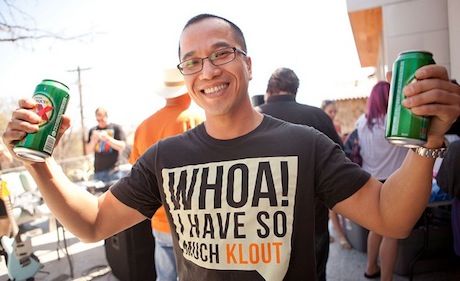Simon Says: I hate Klout

I guess the title says it all but this would be a really boring blog post if I just wrote “see above”. I am sure I am not alone, but from the legions of people who seem to use and put stock in this service I feel very much Han Solo.
First off I want to say on paper the idea for Klout is great. A 'measure of influence' would be a great thing for me to have in my day to day job. But it’s not something that can be quantified…particularly not the way Klout does it.
In our offline lives, we meet thousands of people between birth and death and how much they influence us will vary. How much contact we have with them and the amount we give two cents about their two cents will have a much bigger impact than the number of contacts in their phonebook.
Klout takes your number of interactions, Followers and how often you Tweet and gives you a score (incidentally mine was 38). Now if this website was “a bit of fun” for people to share if they are a 'Power Twitter User' or a Novice I’d have no issue with the service. But increasingly the social media industry seems to be putting a larger emphasis on a user’s Klout score. I was asked for mine the other day when I met a social media manager from another agency, upon hearing my score, he proudly proclaimed his was 52.
I missed the meeting when we went back to high school. I also missed the newsletter when your score on a website was something to be proud of… the last time this happened a friend submitted my photo to Hot Or Not.
Surely to calculate how influential someone is you need to have a specific area, person or topic to hold them up against. I’d not hold much stock in Stephen Hawkings Tweets about cooking, but on space I’d definitely listen. He may make a great cheesecake, but he's not who I’d go to for that information.
But Simon, how can we measure influence then?
I don’t really have an answer. I don’t think it’s possible without being very specific about your reasons for giving them such a title. You would need to state what area of expertise they have knowledge of and then specify a user (or group of) to state specifically that they have some sort of influence over their choices. This is very hard, so I can understand why Klout (and similar services) stick to numbers, formulas and generalisations.
By scanning a person’s profile and seeing how often they Tweet, you can see how much free time they have. Several celebrities I Follow update maybe once a week...and I give a shit when they do. Should their Klout score be lower than mine? (I Tweet at least 30 times a day according to howoftendoyoutweet.com). I often care very little when a brand Tweets an advert directly at me or a friend lets me know they found a penny on the floor.
Can it be done by the number of Followers? I don’t put much stock in mass figures (as you can see from my last blog post). Charlie Sheen has 4 million Followers and I’d bank good money the majority of those will never pay to see him live nor care what he’s doing 10 minutes after they’ve read the Tweet.
What about interactions? Well you can judge someone by this. You need to. Especially with a hard coded method of judging someone’s influence. If you only Tweet links and updates, the code will assume you’re a Twitter-bot. Interactions is what people do best.
For my money I would want Klout to take into account time.
Each week I’d like to get a little email telling me how influential I am and if it’s changed. I believe because of the speed of social media (particularly Twitter) you need to estimate (and that’s all Klout and similar services can do) a person’s impact on a week-by-week basis.
But even if it took time into consideration I have to ask: Does anyone else think this is a lazy option? When I research how “influential” a blogger or Twitter user is I put time and effort into seeing how loyal their audience is first. But then I look for someone with a personality that suits the brand I am working with; because at the end of the day they’ll be representing someone I work for and (in the bigger picture) me.
I'll rarely Follow someone on the basis I laughed at one Tweet. Nor will I put a blog in my RSS reader until I've read 3/4 posts and judged for myself if I care what they have to say. Am I alone in doing this?
It’s much better to put time, effort and the personal touch into this research so you can find someone who’s reliable, professional & who you could form a long-term business-based relationship with. This way you can mutually work together to achieve some great work that both the blogger and the brands audience will want to engage with.
If I had a gun to my head, I’d be honest…I do have a formula for calculating engagement. But it’s only as a starting point for my research.
Here goes -
Take the number of Followers you have after removing anyone who you are Following; If you’re Following them and they’re Following you, you’re either friends or know each other in some way, this method leaves the number of Followers you have which care what you have to say.
Minus
The number of people you’re Following – again minus the people Following you for the same reason.
Keep this number for later.
Take the total number of Re-Tweets you got that week and times it by the total number of unique Re-Tweeters (if someone has Re-Tweeted every Tweet you’ve made that week, they only count once).
Keep this number for later.
Add up all of your @mentions for that week and divide it by the number of conversations you’ve had. Times that number by the total number of unique users who @mentioned you that week, minus 1.
Keep this number for later.
Now add up all of those numbers. If it spelt 55378008 write a comment below because you’re worth following. If it didn’t I am afraid you’ve wasted your time. But as a conciliation prize, your Klout score is probably higher than mine.
Chinwag Update: There's been a flurry of comments and twitter chat since this post originally went live. Check out this follow-up post from Joanne Jocob's on Influence & Marketing.
Photo (cc) Kris Krug.



Comments
Klout score is nonsense...agreed!
There is the assumption in the model that influence is dependent on involvement with specific social media platforms ie. FaceBook, LinkedIn and Twitter. Therefore by definition if you are not using these platforms to publish your wise words...you have no influence...
But if you want to know which hairdresser has greater reach than another hairdresser if you are doing a product placement for shampoo, as opposed to the identification of the most authoritative voice on neo natal care in relation to lung disease, you might use Klout.
Having said that Oli Snoddy (Doremus) wrote a comment or two on Twitter about sausages, and low and behold his Klout score leapt from 30 odd to 58 with sausage as his specialist subject - :)
Klout definitely #fails on many counts
My Klout score fell while I was on holiday - making me less "influential" when was was fully rested and slightly tanned. Surely a flaw. I also wonder about the high value it places on "activity" i.e. lots of tweets. Are chatterboxes more influential - in any sphere of life - than quiet, deliberate people?
Holiday
Yeah the value it puts on the number of tweets annoys me. I believe it needs to let you set keywords / phrases and look at how often you talk about subjects. This way you can see how influential a person is in a very specific area... making the info more helpful.
But like I said, if you're using if for fun & games the numbers are interesting. But not to be taken without a mountain of salt.
I am just off on holiday, I bet my score drops. maybe follow me so it stays high?
Si
Your Klout score just went up...
...only a tiny fraction. But I'll be finding you on Twitter, and following you. You present a good argument on why Klout ain't right - but there are many of those. More importantly, you propose an alternative (something most can't be bothered to do). Finally, your calculation resulted in a number that, to me, is a time-machine to a happy period way back in the mid-80's - and for that alone, you made my day!
Cool
Thanks for letting me know
I didn't give an alternative because I think it's impossible to do. You need to actively Follow the users you think will / are influential and see how their level of influence changes over time (based on the criteria you set). Which is why it's arborary to say the least. Far too "school playground" for my taste.
I am working on a little method of seeing how influential people are, but it'll have far less to do with the number of Followers / Following someone has and more on how much engagement specific Tweets have. Can't really say much more as it's a work in progress. I already know how flawed my method will be, but know it'll only be a way of identifying a group of people who I will personally investigate further.
Glad you enjoyed the numbers game. As I sit here in an airport waiting to board a flight, bored out of my mind, your comment has made my day.
Have an awesome weekend,
Si